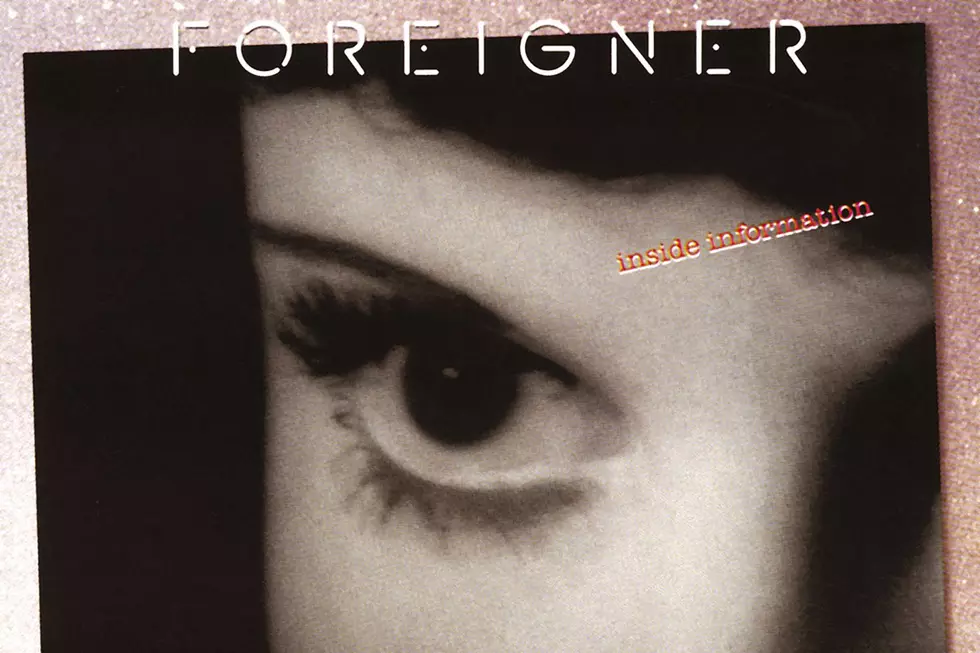
35 Years Ago: Why Foreigner Went Soft With ‘Inside Information’
When Foreigner's sixth studio album, Inside Information, arrived on Dec. 7, 1987, it further drove a wedge between the band's two creative forces.
Ballads had become a big part of Foreigner’s ongoing chart success in the ‘80s, beginning with "Waiting for a Girl Like You" on 1981’s Foreigner 4 and continuing through the massive success of "I Want to Know What Love Is," which spent two weeks at the top of the Billboard Hot 100 in early 1985.
This stylistic direction caused enormous tension within the group. Though vocalist Lou Gramm targeted collaborator Mick Jones as the culprit, the guitarist insisted he wasn’t the one to blame, instead pointing the finger at radio programmers who pushed softer tunes onto the listening public.
Though Inside Information was armed to continue Foreigner's string of ballad-based hits, Jones claimed the band's formula wasn't modified.
“Our ratio of ballads to rockers had never really changed,” he explained in the liner notes for 2000’s Jukebox Heroes compilation. “I think the slower songs tended to take prominence in those years, probably because of the radio situation at the time. At that point, things seemed more in their control than ours.”
“Say You Will,” the first single from Inside Information, had a rock edge, but also embraced a very pop and keyboard-heavy feel. The same template was in place for other songs on the album, including the opener, “Heart Turns to Stone,” and the title track.
Listen to Foreigner's 'Say You Will'
Still, at least in his view, Jones always kept the idea of Foreigner being a true rock band close at hand. "I think we've maintained consistency throughout, even with all the drastic changes in musical trends,” he told Rock Express in 1988.
Songs like “Counting Every Minute,” “A Night to Remember,” and especially, the Led Zeppelin-esque swagger of “The Beat of My Heart” spoke to Jones’ general goal with Inside Information to make sure that Foreigner kept a guitar-driven focus.
The sound of “Beat” was no accident. As he told Kerrang! in 1987, his riffing on the track was purposefully a tribute to Jimmy Page. “I’d always wanted to do something like that,” he said at the time.
Listen to Foreigner's 'The Beat of My Heart'
Jones also gained fresh inspiration as a result of working on Van Halen’s 5150. "When I finished that I was ready to start recording our album,” he said during the conversation with Kerrang! “It was the first time I'd produced outside of Foreigner and the energy and speed with which it was done turned me around."
In some ways, it was a miracle Inside Information ever got recorded.
"The band was on shaky ground, and for one day we did actually break up,” Jones admitted to Rock Express, explaining Foreigner’s tenuous situation after touring behind 1984's Agent Provocateur. “I called Lou up and said it's pretty stupid to end such a great career like this."
Even as they decided to return to the studio and make another album, Jones recognized that the dynamic had changed. “It was pretty clinical,” he recalled. “I’d basically prepared the tracks. Lou came in and sang them very professionally.”
Gramm was merely a “visitor," the guitarist assessed. “He was entrenched in his camp and I was entrenched in mine. We would literally do it in segments. It wasn’t the old partnership at work.”
The singer felt similarly. “I was punching the clock,” Gramm admitted in his 2013 memoir, Juke Box Hero. “I was miserable, because I no longer felt like I was contributing anything significant other than my pipes,” he explained. “Creatively, I had been locked in a cage. My vocals were on Inside Information, but my soul wasn’t.”
Feeding Gramm's misery was what he observed as the continued “soft-rock approach.” “I Don’t Want to Live Without You” was another ballad put on his plate, and though Jones was “excited” about the song Gramm felt dramatically different. “I thought it stunk to the point that I didn’t even want to sing it,” the frontman admitted.
He brought that mindset into his performance in the studio. “I under-sang it,” he said. “No little twirls, no passion, no Lou Gramm vibe to it.” While plenty of records have died on the vine as a result of similar sleepwalking, the same would not happen for “I Don’t Want to Live Without You." "Despite my efforts to sabotage the blasted song, it shot all of the way up the charts to number five," Gramm noted.
Listen to Foreigner's 'I Don't Want to Live Without You'
"Say You Will" performed similarly well, landing inside the Top 10, but ultimately these hit singles did little to quell the tensions between Gramm and Jones. Following a forced span of touring and promotion for Inside Information, the pair once again split apart.
Each pursued their own interests for several years, eventually reconnecting for a trio of new songs in the early ‘90s, which was paired with a reunion tour in 1993. That renewed activity brought one more album, 1994’s Mr. Moonlight and they continued to work together until 2002.
Decades later, Gramm still had “mixed emotions” regarding Inside Information. ”Coming off of Agent Provocateur, I had hoped that we would take a little bit more time with our writing and make sure that we re-established ourselves as the rock band that we intended to be,” he explained to UCR in 2013. “I think there were less rock songs and more pop songs on Inside Information. The ones that did rock didn’t get much attention because it seemed that the record company was once again pushing the ballads.”
Regardless of its perceived flaws, Inside Information added another chapter to Foreigner’s legacy. The shimmering “Out of the Blue” is one particular underrated highlight, which Gramm told UCR in 2015, “could have been a contender.”
“I think it’s remarkable that we came up with the album that we did,” Jones admitted in the Jukebox Heroes liner notes, alluding to Inside Information's complicated circumstances. He later lamented in 2017’s A Foreigner’s Tale just how much Gramm’s collaborative absence was felt. “He was completely divorced from me on Inside Information and his input was missed in every respect,” the guitarist wrote. “It ended up being our least successful album to that point."
Top 100 '80s Rock Albums
More From Retro 102.5










